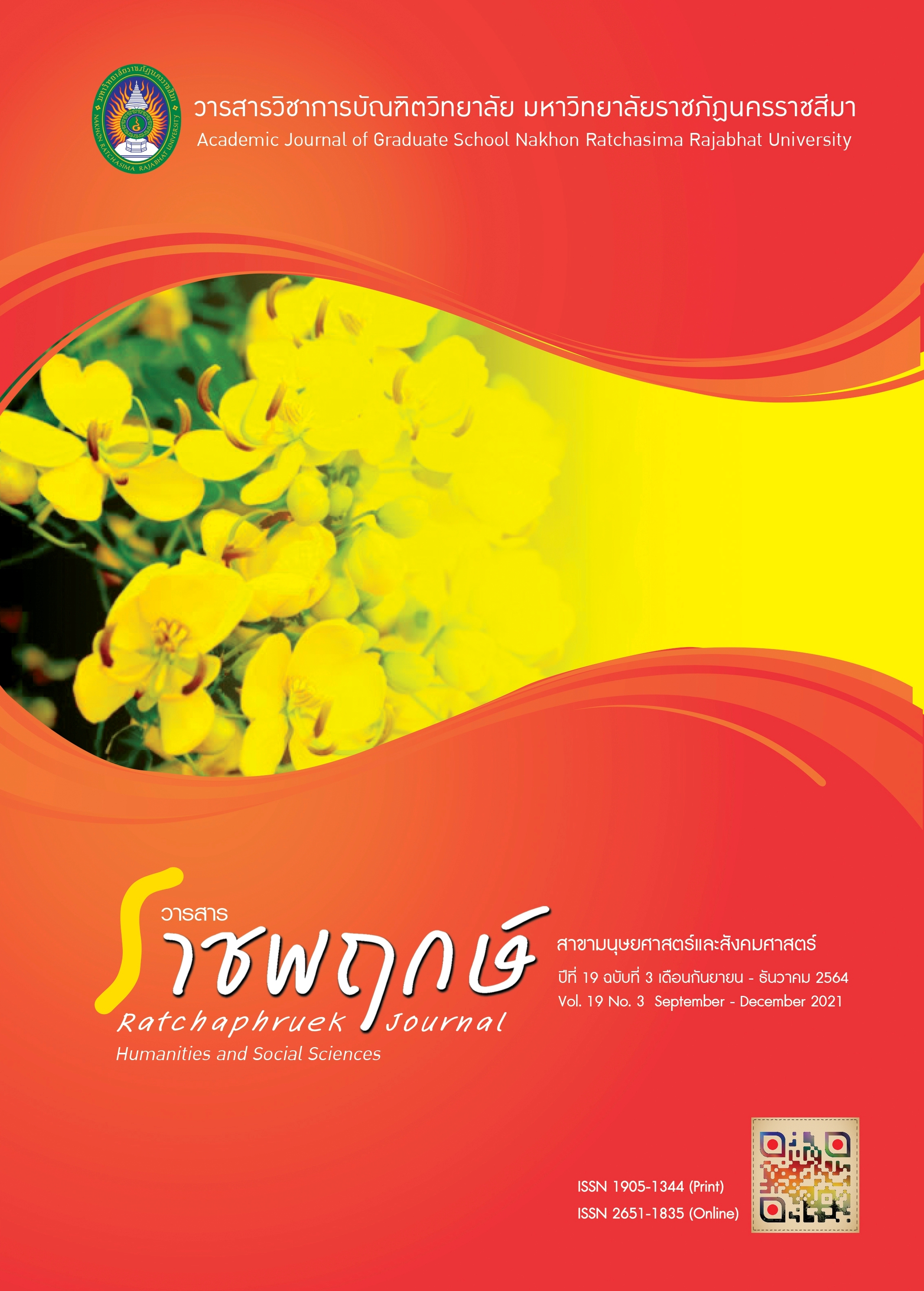Learning Management with Concept Mapping on Digestive System to Enhance Systems Thinking and Learning Achievement for Grade 11th Students
Main Article Content
Abstract
The research aimed to study the learning management by using concept mapping to enhance system thinking. The purposes of this study were: 1) To compare students’ systems thinking before and after receiving the learning management with concept mapping; 2) To compare the students’ learning achievement after learning with the 70 percent criteria; and 3) To study correlation between students’ systems thinking and their learning achievement after learning. The 39 sample from cluster random sampling were grade 11th students, in the second semester of the 2020 academic year, at Anukoolnaree School, Kalasin Province. The research instruments were lesson plans, the system thinking test, and the learning achievement test. Data were analyzed by mean, percentage, standard deviation, t-test, and multiple correlation analysis.
The research results were found that; 1) Students’ systems thinking were significantly higher than before the learning at the .05 level. 2) Students’ learning achievement were significantly higher than the 70 percent criteria at the .05 level. 3) The students' systems thinking and learning achievements revealed the positive correlation at .05 significant level. The system thinking could be supported the learning achievement on digestive system of grade 11th students up to 90 percent.
Article Details
References
กระทรวงศึกษาธิการ. (2560). ตัวชี้วัดและสาระการเรียนรู้แกนกลาง กลุ่มสาระการเรียนรู้ วิทยาศาสตร์ (ฉบับปรับปรุง 2560) ตามหลักสูตรแกนกลางการศึกษาขั้นพื้นฐาน พุทธศักราช
2551. กรุงเทพฯ: โรงพิมพ์ชุมนุมสหกรณ์การเกษตรแห่งประเทศไทย จำกัด.
ทวีศิลป์ กุลนภาดล. (2556). ความสัมพันธ์ระหว่างรูปแบบการคิดกับผลสัมฤทธิ์การวิจัยเชิงปฏิบัติการในชั้นเรียนของนักศึกษาครู คณะครุศาสตร์ มหาวิทยาลัยราชภัฏราชนครินทร์. วารสาร
ศึกษาศาสตร์ มสธ, 6(2), 9-19.
บุญเลี้ยง ทุมทอง (2553). การพัฒนารูปแบบการจัดการเรียนรู้เพื่อพัฒนากระบวนการคิดเชิงระบบ วิชาคณิตศาสตร์ ระดับช่วงชั้นที่ 4 (วิทยานิพนธ์ศึกษาศาสตรดุษฎีบัณฑิต).
ภาณุพงศ์ โคนชัยภูมิ. (2560). การพัฒนากิจกรรมการเรียนรู้ตามแนวคิดสะศึกษา เรื่อง การสังเคราะห์ด้วยแสง ชั้นมัธยมศึกษาปีที่ 5 เพื่อส่งเสริมผลสัมฤทธิ์ทางการเรียนและความสามารถ
ด้านการคิดเชิงระบบ (วิทยานิพนธ์ปริญญามหาบัณฑิต).
วิทยา สุหฤทดำรง และศิรศักย์ เทพจิต. (2550). การคิดเชิงระบบ (system thinking: เครื่องมือจัดการความซับซ้อนในโลกธุรกิจ. กรุงเทพฯ: อี.ไอ.สแควร์.
สถาบันทดสอบทางการศึกษาแห่งชาติ. (2562). ผลการประเมินการทดสอบทางการศึกษาระดับชาติ. สืบค้นเมื่อ 4 เมษายน 2563, จาก http://www.newonetresult.niets.or.th/
AnnouncementWeb/PDF/SummaryONETM6_2562.pdf
สุนีย์ สอนตระกูล. (2535). การพัฒนาระบบการเรียนการสอนแบบจัดอบรมมโนทัศน์สำหรับวิชา ชีววิทยาระดับชั้นมัธยมศึกษาตอนปลาย (วิทยานิพนธ์ปริญญาดุษฎีบัณฑิต).
สุมนา โสตถิผลอนันต์. (2560). ศึกษาการพัฒนาความสามารถในการคิดอย่างเป็นระบบโดยใช้ การเรียนรู้แบบระดมสมองในการจัดทำผังมโนทัศน์ ของนักศึกษาชั้นปีที่ 1
หลักสูตรครุศาสตรบัณฑิตวิทยาลัยการฝึกหัดครู มหาวิทยาลัยราชภัฏพระนคร. วารสารวิชาการครุศาสตร์, 8(1), น. 200-208.
Cheema, A.B., & Mirza, M.S. (2013). Effect of Concept Mapping On Students’ Academic Achievement. Journal of Research and Reflections in Education 7(2),
pp. 125-132.
Assaraf, O.B.-Z., & Orion, N. (2005). Development of systems thinking skills in the context of earth system education. Journal of Research in Science Teaching.
42(5), pp. 518-560.
Ausubel, D. P. (1968). Educational Psychology: A Cognitive View. New York: Holt, Rinehart & Winston.
Fatokun, K.V.F. & Eniayeju, P.A. (2014). The effect of concept mapping-guided discovery integrated teaching approach on Chemistry students' achievement
and retention. Educational Research and Reviews. 9(22), pp. 1218-1223.
Kreutzer, J.M.G. (2001). Foreword: Systems Dynamies in education, System Dynamic. 9(2) p. 22.
Riess, W. & Mischo, C. (2010). Promoting systems thinking through biology lesson. International Journal of Science Education, 32(6), pp. 705-725.


